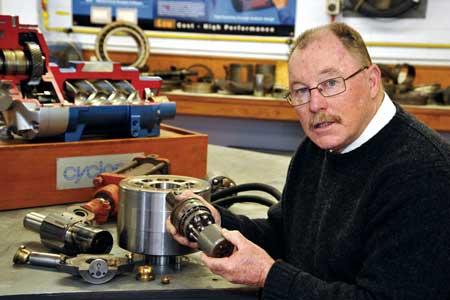|
ON THE eve of two important hydraulic and pneumatic maintenance seminars at the MIT’s Maintenance and Reliability Centre in August, the associated trainers are agreed on one worrying fact – there is a serious lack of ongoing maintenance training happening across the board in New Zealand industry and it’s raising serious reliability issues.
Specifically addressing the hydraulic and pneumatic sectors, the issues often come down to ignorance of the basics, such as the need to keep oil free from contamination, and keep compressed air dry and clean.
Jean-Michel Demaret, lubrication engineer with Mobil Oil New Zealand says he wouldn’t be surprised if a study showed that 90 percent of the hydraulic oil sold in this country is wasted through system leakages or contamination. “Over the past ten years I cannot remember ever recommending changing hydraulic oil because the lubricant was worn out. Generally continuous replenishment due to leakage keeps the oil in good shape, or water and dirt have entered the system and the oil requires changing.”
Mark Emerson, product executive – hydraulics division at Cookes, says contaminants are a major issue. “Talk to any hydraulic components supplier or repairer and they’ll say often the pump and motor fail a couple of weeks after a hose has been replaced. The introduction of contaminants, particles of wire, rubber abrasion dust from the cut-off saw, swarf from couplings, etc – that’s just from making the hose – is a problem. And then what about installing the hose? Once cleaned it should be capped or plugged.”
Emerson’s main message for students is to take all practical precautions to prevent contaminants from entering systems. “I’ll be teaching the importance of understanding oil types, oil filtration, and the elimination of contaminants. It’s the lack of knowledge that causes failures.”
Larry Wiechern, senior lecturer at MIT’s Maintenance and Reliability Centre, believes there’s a serious lack of knowledge on what can and can’t be repaired, and how to get plant back on stream as soon as possible. Another danger is the application of techniques that may be OK for one situation, but can cause all sorts of problems if applied to another.
“Both hydraulics and pneumatics have advanced a great deal over recent times. An appreciation of what is acceptable with today’s technologies can avoid creating problems that didn’t exist until new pre-lubricated materials were introduced. Some engineers are still treating these materials as they have in the past, thinking they are doing the right thing by applying lubrication to them.”
Andrew Martin, Auckland branch manager for SMC Pneumatics predicts that the current lack of apprentices being trained across all industry will soon leave a void as ‘baby boomer’ engineers begin to retire. “There is a noticeable ageing of the engineering population and a severe lack of training.”
Martin believes that senior managers want to implement maintenance and reliability training but are constrained by budgets. “But if a person attends a course and implements just a few of the ideas being presented, the return on the course fee will be repaid many times over, and for years to come.”
And there’s the problem of the attitudes of senior management with little or no practical knowledge, and little understanding of the issues surrounding maintenance and reliability.
“Maintenance or preventative maintenance is an expense the corporates don’t like,” says Martin. Breakdowns don’t figure in expenditure budgets, he adds, and many companies have the attitude that ‘if it’s not broken, why look at it?’
Perhaps Cary van Ballegooy, technical support engineer for Global Hydraulics and Controls, and presenter at the MIT’s Hydraulic Maintenance Seminar, sums it up best when he says that “maintenance in New Zealand is really more of a breakdown service”.
|
In his 35 years in the hydraulics industry, van Ballegooy reckons he’s just about seen everything when it comes to poor maintenance practice – and that most of it can be boiled down to pure ignorance.
“Often things are the wrong way around. For example, in a typical scenario the PLC control engineer thinks he’s the boss – so he briefs the hydraulics engineer, who then briefs the mechanical engineer – when really it should be the other way around. The mechanical requirements should dictate the terms, then long-term maintenance issues will be less of a factor.”
Perhaps we can take a lesson from our cousins across the Tasman. Clyde Volpe, of the Vibration Institute of Australia has also seen a lack of understanding in the importance of precision maintenance and what is required to achieve it. “Many companies in Australia backed off on training 15 years ago and had a huge problem finding skilled labour years later. They are still feeling the effects – however, there’s a lot of money being spent on training people now so they can perform the maintenance task better.
“Rio Tinto is now seeing improved availability from ageing plants, and a huge contribution has come from condition monitoring and a focus on precision maintenance.”
Contact: donna.davies@manukau.ac.nz or larry.wiechern@manukau.ac.nz
|






